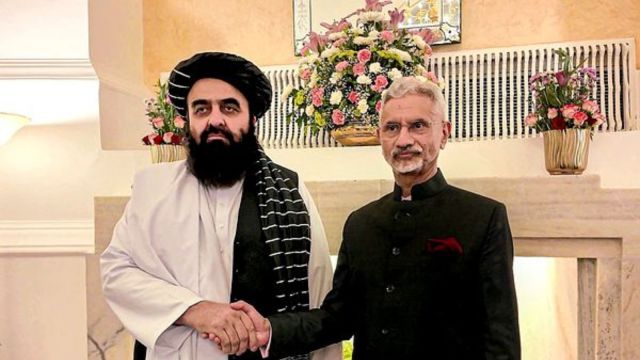
Afghanistan’s Foreign Minister Amir Khan Muttaqi’s visit to India is a time to mainly look forward but also to remain mindful of past India-Afghanistan developments. The latter is to ensure that India’s policies towards the Afghan Taliban proceed positively but soberly. They should not be marked by the unrealistic enthusiasm that its foreign and security establishment displayed towards the Afghan republic in its closing years.
India’s Afghanistan approaches have to be framed within a changing environment in its western neighbourhood. The US has decided that Pakistan should play a major role in India’s immediate and extended western neighbourhood. China is also expanding its influence in this area. Its ties with Pakistan remain ironclad, its influence in Iran and in the Arabian Peninsula has expanded. Russia has accorded diplomatic recognition to the Taliban and its bonds with Iran are strong. It is in this setting that India has to safeguard its interests to its west in the backdrop of Pakistan’s implacable enmity. And it is in this regional setting also that Muttaqi is visiting India to promote mutual interests.
External Affairs Minister S Jaishankar met Muttaqi on October 10. He announced that India would re-establish its mission in Kabul. It has had a technical team in the Afghan capital since June 2022; hence, the move to formally reopen its embassy was overdue. Jaishankar implied that, for the time being, a chargé d’affaires would be appointed. This indicates that India does not want to give a signal that it is diplomatically recognising the Taliban till there is a consensus in the international community to do so. This is the correct approach.
While it may disappoint the Taliban, it will ensure that it does not ruffle feathers in Washington that India has joined the Moscow-Beijing camp on Afghanistan. It is necessary to signal this especially as India had joined the consensus at the recent Moscow meeting that no country should have military structures in Afghanistan. Soon, India should state that it is for the Taliban to decide their country’s security policies and foreign relations and no one else.
If India reopens its embassy in Kabul, it would have to allow the Taliban to control the Afghan embassy in Delhi sooner rather than later. That would also imply that it would fly the flag of the Afghan emirate. That, too, should not cause India any diplomatic discomfiture because it would not imply formal diplomatic recognition. The fact cannot be overlooked that the Taliban has controlled all Afghan territories since it captured Kabul in 2021. There is no opposition either within or outside the country that can overthrow it. This is a factor that the entire international community has to accept.
Western demands for the Taliban to adhere to universally accepted norms on human rights will continue. But it is unlikely to do so. The group is committed to its Deobandi-Wahhabi interpretation of the Sharia. It will not abandon its theological moorings. Jaishankar did well not to venture into the area of human rights.
This marked a departure from the past. The India-US 2+2 Joint Statement in November 2023 had noted, “The Ministers urged the Taliban to respect the human rights of all Afghans, including women, children, and members of minority groups; and uphold freedom of travel.” Jaishankar’s silence on the issue is not because India endorses the Taliban approach on these issues but because it has had to do business with states, over the decades, that have pursued almost Taliban-like policies. But they are affluent and, hence, the custodians of human rights in the West have preferred to turn a blind eye to their approach to human rights.
In his opening remarks at the meeting, Jaishankar referred to the “shared threat of cross-border terrorism that both our nations face”. These words connote that India stands with the Taliban against Pakistan’s covert and overt actions against it. Naturally, Pakistan and China will be wary of India-Taliban cooperation in the security field but it is a natural consequence of threats that both face from the same quarter.
This is ironic because it was Pakistan that sustained the group for over two and a half decades. Pakistan was instrumental in the Taliban inflicting a strategic defeat on the US to return to power in Afghanistan. What Pakistan obviously overlooked is that, as with other Afghan regimes in power in Kabul, the Taliban would not accept any interference in its India policies. Nor would it hand over its Tehreek-e-Taliban Pakistan (TTP) kin to the men in khaki. And, of course, Pakistan also forgot the immutable and historical contradictions between peoples living on the opposite banks of the Indus!
Jaishankar spelt out the areas, stretching from food to health to training and education, where India would cooperate with the Afghan people. He also said that India would complete stalled projects. The Taliban would welcome Indian assistance in these areas but what it would look for is greater liberalisation in the visa regime for students and the sick. India should not hesitate to accept more Afghan visitors subject to security checks. This is vital to take the relationship forward and there is little danger of Afghans wanting to permanently settle in India.
It is also encouraging that Muttaqi desired greater Indian involvement in mining and other sectors of the Afghan economy. Clearly, the Taliban doesn’t wish to become China’s economic vassal even as it is mindful of the need for greater investment. India cannot afford for Afghanistan to become economically integrated with western China.
The Taliban will have to manage the major powers’ interplay and also Pakistani pressures on relations with India. To do so, it wants enhanced Indian engagement in Afghanistan. This is in keeping with traditional Afghan policies. For India, a firm presence in Afghanistan is key to ensuring that it successfully manages any negative impact emanating from great power geopolitics in its western neighbourhood.
The writer is a former diplomat